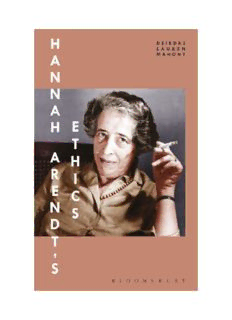
Hannah Arendt’s Ethics PDF
Preview Hannah Arendt’s Ethics
Hannah Arendt’s Ethics Also available from Bloomsbury Heidegger, History and the Holocaust, Mahon O'Brien The Aesthetico-Political, Martín Plot Arendt: A Guide for the Perplexed, Karin A. Fry For Jeanmarie, Shay and Shyam Hannah Arendt’s Ethics By Deirdre Lauren Mahony University of Hamburg, Germany Contents Acknowledgements List of Abbreviations Introduction: Hannah Arendt and Ethics after Auschwitz Philosophy and politics Ethics and politics Arendt’s ethics Hannah Arendt and ethics after Auschwitz 1 Arendt, Eichmann and the Banality of Evil Arendt on Eichmann The Eichmann controversy Was Arendt wrong about Eichmann? Banality: One form of evil Intention and moral responsibility Neiman on Arendt Intention Responsibility Moral luck Concluding remarks 2 Thinking and Evil Arendt on thinking and morality Thinking: A particular kind of process Thinking as destructive Thinking as dialogue Conversation: A model for Arendt’s notion of thinking? Thinking, reality and the other The moral relevance of thought Is thinking a moralizing activity? Does the thinking process lead one to moral truth? Thinking as destructive, aimless and without result Can evil be an object of thought? Characterizing the dialogue of thought Ability to think and responsibility Morality and politics; thinking and judging Concluding remarks 3 Evil and Living with Oneself Reflections on meta-ethical positions in Arendt’s work Arendt on living with oneself Problematic elements of Arendt’s notion of ‘Living with Oneself’ Can living with oneself be an ultimate moral standard? Is living with oneself the same as thinking? Does everyone live with him- or herself or only a select few? Does the notion of living with oneself undermine the thinking thesis? Character, integrity and living with oneself 4 Nonparticipation Individual (moral) guilt and collective (political) responsibility Moral incapacity The morally unthinkable Conclusion Bibliography Index Acknowledgements I would like to thank Christopher Hamilton and Robert Weninger for their academic guidance and advice, and Sarah Schmidt for her support. My thanks also go to Frankie Mace at Bloomsbury for her enthusiasm for this project. To my parents and my husband, I owe a deep debt of gratitude for their continued patience and encouragement. List of Abbreviations ‘CR’ Hannah Arendt, ‘Collective Responsibility’, in Hannah Arendt, Responsibility and Judgment, ed. Jerome Kohn (New York: Schocken, 2003) EiJ Hannah Arendt, Eichmann in Jerusalem: A Report on the Banality of Evil (New York: Penguin, 2006) EU Hannah Arendt, Essays in Understanding, ed. Jerome Kohn (New York: Schocken, 1994) HC Hannah Arendt, The Human Condition (Chicago: University of Chicago Press, 1998) LKPP Hannah Arendt, Lectures on Kant’s Political Philosophy, ed. Ronald Beiner (Chicago: University of Chicago Press, 1982) LMT Hannah Arendt, The Life of the Mind, Volume One: Thinking (New York: Harcourt, 1978) OR Hannah Arendt, On Revolution (New York: Penguin, 2006) OT Hannah Arendt, The Origins of Totalitarianism (New York: Harcourt, 1968) ‘PR’ Hannah Arendt, ‘Personal Responsibility Under Dictatorship’, in Hannah Arendt, Responsibility and Judgment, ed. Jerome Kohn (New York: Schocken, 2003) R&J Hannah Arendt, Responsibility and Judgment, ed. Jerome Kohn (New York: Schocken, 2003) ‘SQ’ Arendt, ‘Some Questions of Moral Philosophy’, in Hannah Arendt, Responsibility and Judgment, ed. Jerome Kohn (New York: Schocken, 2003) ‘TMC’ Hannah Arendt, ‘Thinking and Moral Considerations’, Hannah Arendt, Responsibility and Judgment, ed. Jerome Kohn (New York: Schocken, 2003) Introduction: Hannah Arendt and Ethics after Auschwitz Hannah Arendt, the Jewish–German (and later American) thinker, writer and teacher, has become a well-known figure in twentieth-century Western intellectual life, particularly in her adopted home of the United States. Arendt was an émigré who fled the persecution in Europe. Finding refuge in America, she developed reflections on totalitarianism, Jewish identity, political theory and practice, culture, education and ethics that have informed numerous discourses in modern American and European philosophy, politics and history. Arendt has been variously considered a philosopher, a political scientist, a historian, a German romantic apologist for Heidegger, a disciple of Karl Jaspers, a Zionist and an enemy of the Jewish people. Her work has been both harshly criticized and reverently praised, her thinking considered original by some and derivative by others. Critics have emphasized her perceived conservatism as well as some of her more radical approaches, depending on their vantage point in the political spectrum. Her presence ‘in the world’, that is to say, her significance as a public thinker for public discourse and the contribution her thinking has made to the study of some of the most fundamental concepts in Western thought (totalitarianism, revolution, freedom and action in politics, for example) are considerable. Whether provoking fierce (and sometimes bitter) controversy or respectful veneration, even her detractors would admit that Hannah Arendt has had a significant impact on modern thought. Recent years have seen renewed interest in Hannah Arendt’s work, from both within and outside the Academy. The year 2011 marked the fiftieth anniversary of the trial of Adolf Eichmann in Jerusalem, on which Arendt had famously (and controversially) reported. Consequently, the last few years have witnessed a revival of discussions of the trial, its outcome – Eichmann’s execution – and the interpretation of Eichmann and his motivations that Arendt proposed in her reports. Significant new books have been published which once again seek to
Description: